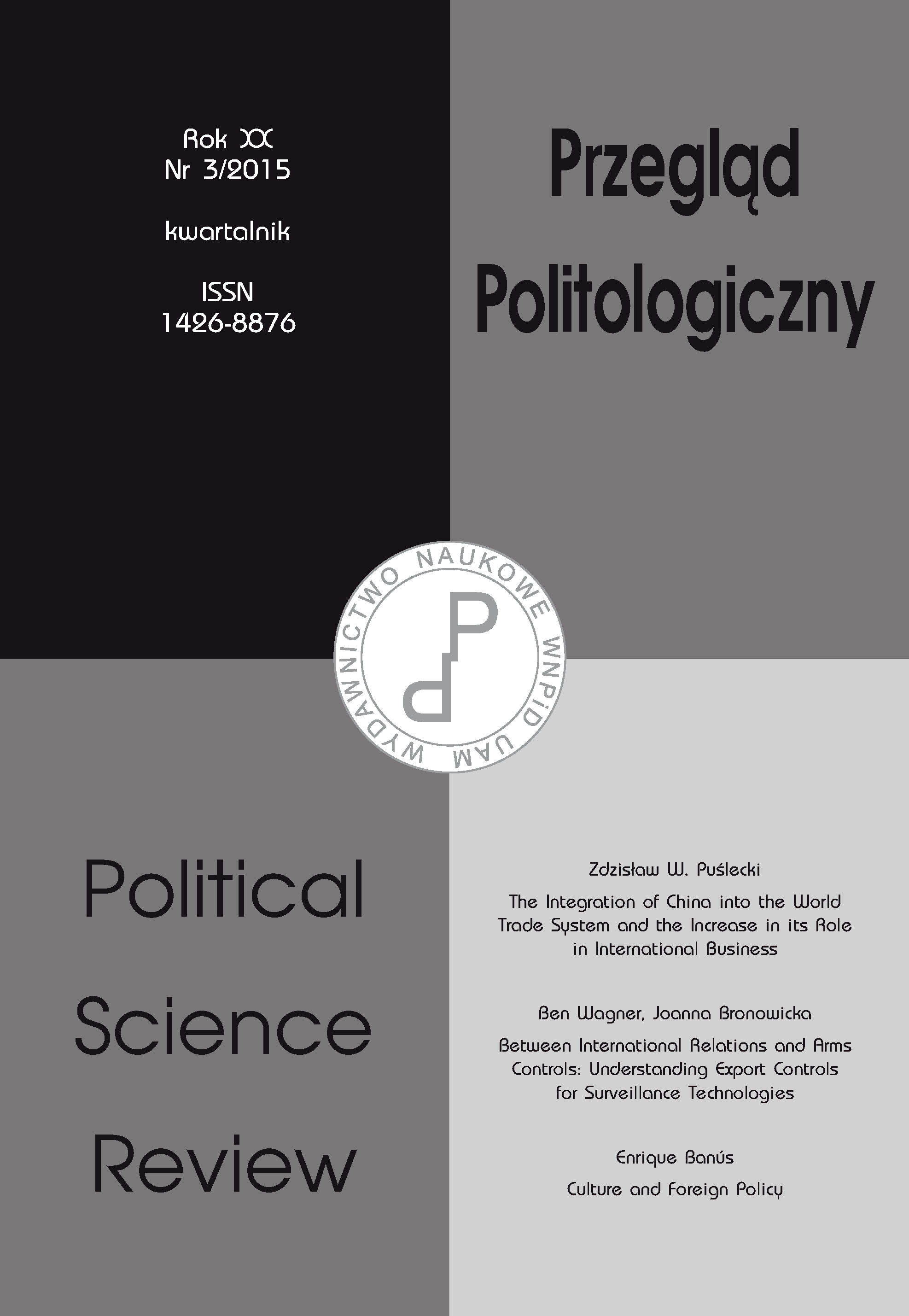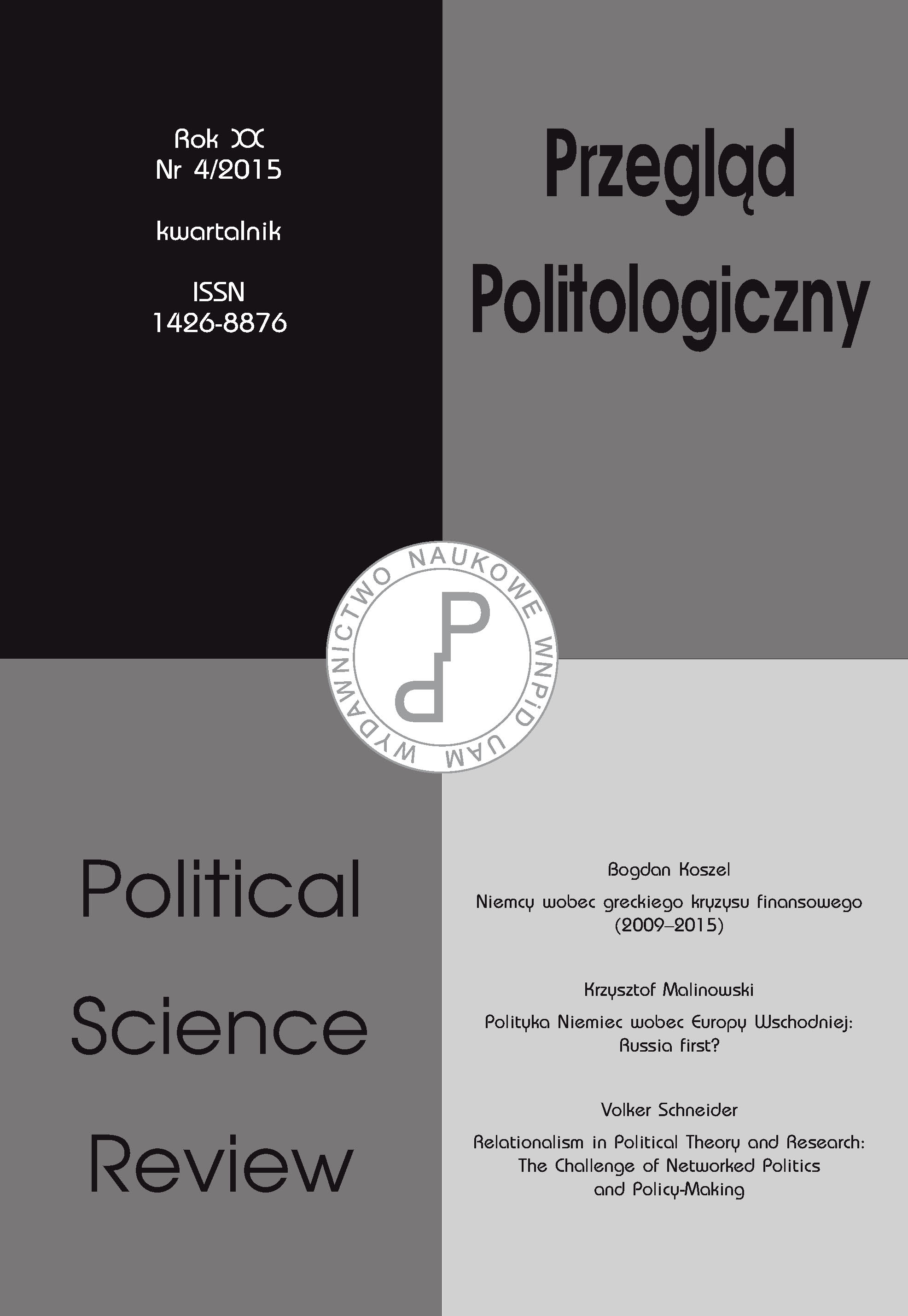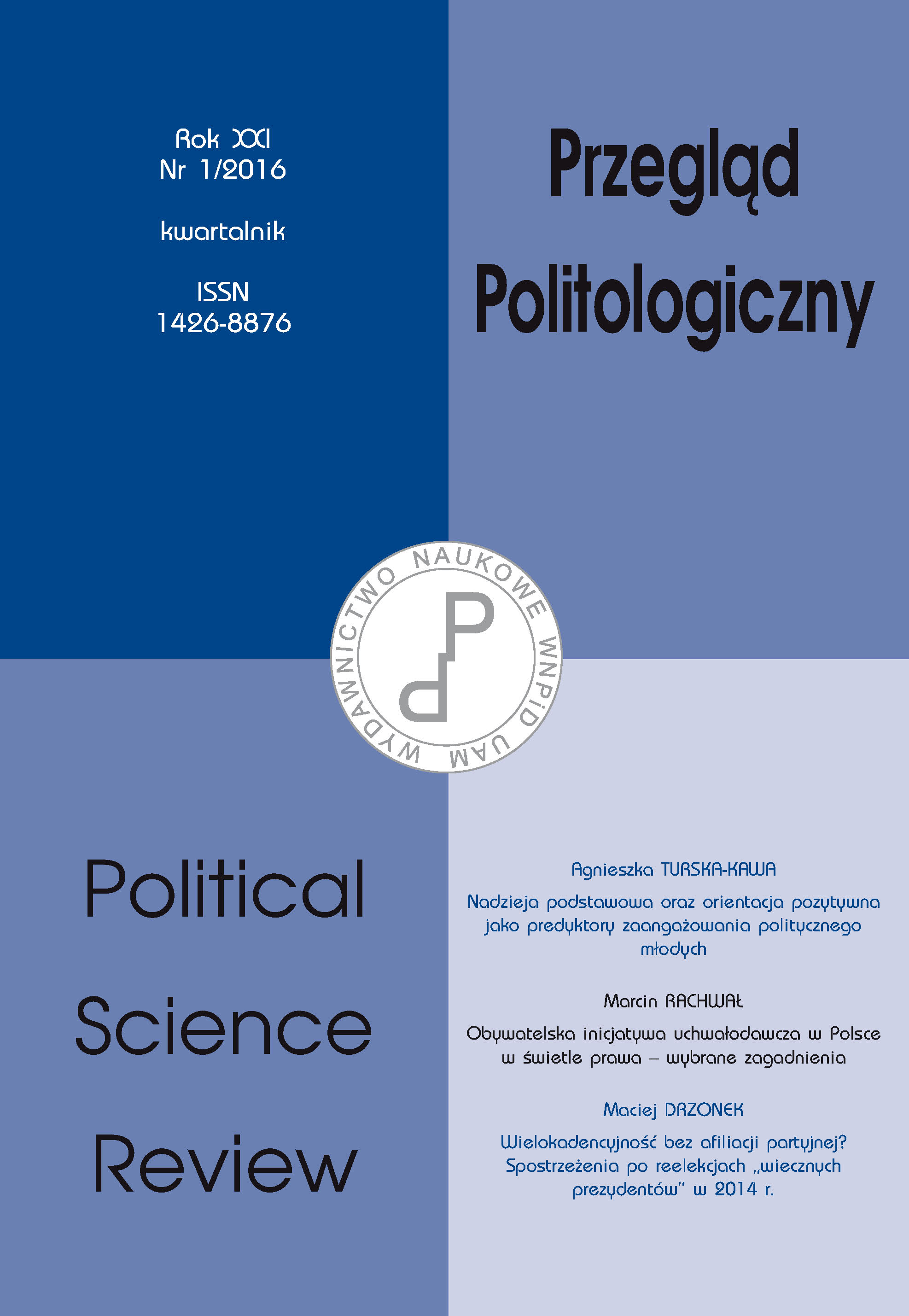
We kindly inform you that, as long as the subject affiliation of our 300.000+ articles is in progress, you might get unsufficient or no results on your third level or second level search. In this case, please broaden your search criteria.


The author of the paper analyses the German position on the Greek crisis in public finances after 2009. He points out that providing financial aid to Greece was never questioned, even in Germany. What the government of Angela Merkel had in mind, however, was for Greece to implement strict austerity and budgetary discipline, on which the assistance from international financial institutions would rely. In its policy towards Greece, the German Chancellor had to take into account the reactions of German society, which was reluctant to make concessions and further outlays from the German budget for the defaulting partner.
More...
The strategic assumptions of German Ostpolitik have been undermined by the aggressive activities of Russia during the Ukraine crisis. The tight economic relations between Germany and Russia have not brought about domestic transformations in the political system in Russia, and have not reduced its interest in regaining its imperial position in Eastern Europe, i.e. in the area of the former Soviet Union. Germany’s support for both the reform program in Ukraine and deepening its relations with the EU has shown that it is ready to critically evaluate its strategy toward Eastern Europe and review its ‘Russia first’ approach.
More...
The migration crisis which affected the European Union after the so-called Arab Spring intensified in 2015 as a result of the conflict in Syria, as well as due to the German promise to grant protection to all Syrians who entered the territory of Germany. Consequently, migration pressure increased and affected the transit countries: Italy, Greece and Hungary. Since that moment, deep differences have been visible concerning the ways to address the migration crisis, especially the quota system proposed in May and September 2015 by the European Commission.
More...
The purpose of this paper is to analyse British policy, and position and their evolution in the context of the activities of Robert Schuman as French Prime Minister and Minister of Foreign Affairs. The general framework of the analysis encompasses the period between 1947, when Robert Schuman was appointed Prime Minister of France, and 1950, when the Schuman Plan was presented. To a limited extent, the analysis is continued until 1954, that is up to the collapse of the European Defence Community project.
More...
The political crises in Egypt in 2011 and 2013 constituted an essential element in the entire process of socio-political transformations in the Arab states of North Africa and the Middle East. The ousting of the influential President Hosni Mubarak in February 2011 had a special and symbolic meaning for both Egyptians and the citizens of other Arab states. Therefore, the victory of the demonstrators in Tahrir Square was significant in both its domestic and regional dimensions. The Egyptian success provided a clear incentive for the societies of other authoritarian Arab states, such as Syria, Libya and Yemen. In this context, it is crucial to answer the question of what social, political and economic factors brought about such a rapid political change in Egypt. From the point of view of 2015, is it really true that the ruling elite was replaced, or were the 2011 events largely inspired by circles close to President Mubarak, thereby being only a manifestation of internal competition inside the army and the National Democratic Party belonging to the regime?
More...
Crude oil exploitation forms the basis for the Norwegian economy and the main source of its high level of economic development. Such dependence, however, could be the reason for the emergence of a set of harmful economic phenomena known as the ‘Dutch disease’. Norway avoided most of the negative effects of the ‘Dutch disease’ as a result of conducting effective economic policy in this regard. The subject of the paper is the verification of the hypotheses that Norway has not fully been able to avoid the impact of the exchange rate channel of the ‘Dutch disease’, which consists of appreciation of the national currency and thus weakening competitiveness in international markets. Verification of this hypothesis was based on an examination of the interrelationship between the time series course NOK/EUR and the price of Brent crude oil, over a time interval from May 2003 to January 2015. This analysis used an ec- onometric macro-model built in accordance with the Engel-Grainger methodology. The results of this analysis showed that the exchange rate channel was active in the Norwegian economy, albeit with different intensities in different periods of the sample interval.
More...
This paper suggests that upon comparing the various behavioural models and post-behavioural approaches (mostly understood as “the return of the state” and the concept of the political regime that emerges from that return) to compare political systems, we discover that Aristotle’s science of regimes is a superior framework to various models advanced by the majority of regime frameworks of contemporary comparative political science. In examining that whole attempt to recover the regime as a means to analyze human political behaviour one finally comes to see that Aristotle’s approach allows a more accurate and precise presentation of human political behaviour found within the structure of given political communities that are shaped by the given form of a particular regime.
More...
This paper addresses the issue of whether a proper history of political thought should avoid any contact with substantive political philosophy, as it was vehemently claimed earlier by Cambridge historians of political thought, or not. It argues that (A) a strong political or philosophical bias might kill the credibility of a reliable history of political thought, but (B), in this genre, it is by definition impossible to avoid taking on board politico-philosophical concerns. What is more, the paper also tries to show (C) the relevance of political philosophy for the history of political thought and vice versa. In particular, it will argue along the following two lines: (a) Without a political philosophical self-positioning any reconstruction of the history of political thought remains underdetermined and therefore uninstructive, and (b) without a look at the history of political thought political philosophy remains blind, alienated, theoretically unfounded and therefore potentially even dangerous. Methodologically, the paper aims to recapture some of the conclusions of the debates of the relationship of the two disciplines, with special attention to the French and British contexts (more particularly to the oeuvres of Rosanvallon and Skinner).
More...
Political theory and research approaches are in most cases not explicit in all respects, but are usually shaped by implicit background theories and scientific worldviews, e.g. presuppositions and paradigms. Examples are idealism, materialism or institutionalism. A fairly new perspective in this regard is relationalism. This way of thinking, in its ontological orientation, conceives the world only in terms of relations. Research programmes with a relationalist orientation put this idea into practice with methods of social network analysis which are more and more used also in political science. Several variants of this new -ism and type of network thinking are presented in this paper in a critical perspective. Relationalism is ultimately seen as fruitful perspective, but is seen as limited in its explanatory power, though. It should therefore always be combined with other approaches and perspectives.
More...
Critical discourse analysis (CDA) can be considered the contemporary, dominant approach to the study of national identity, which presupposes that a nation is an imagined community which is produced and reproduced discursively. Moreover, CDA denies the traditional dichotomy between political and cultural nations, which is viewed solely as a purpose-built consequence of power. With regard to the fact that most researchers who use CDA limit their approaches to the modern context of the 20th century, it is desirable to ask to what extent one can apply methods of CDA to pre-modern national identities. The clarification of this issue should be deemed the main aim of this study, which holds that the Polish aristocratic nation is a convenient case for this kind of research, because its elites had to reflect not only the loss of statehood, and thus the programme of future desired development, but also the causes of previous failure. The analysis of the conflicts between conservative national attitudes during the 19th century should therefore define who was considered a Pole and to what extent national identity was based on ideological and discursive assumptions.
More...


The paper presents a study aimed at nding psychological determinants for the political involvement of young people. The study involved veri cation of the importance of predictors such as basic hope (measured with the Basic Hope Inventory BHI-12 by Jerzy Trzebiński and Mariusz Zięba) and positive orientation (measured with the Positivity Scale, adapted into Polish by Mariola Łaguna, Piotr Oleś and Dorota Filipiuk) for the dependent variables presented as three autonomous factors: electoral participation, other forms of political participation, and civic attitude. Taking into account the theoretical assumptions connected with the variables, it was hypothesized in the study design process that those variables could play a signi cant role in political involvement. They were assumed to be among the potentially signi cant foundations generating community behaviors and leading to the development of attitudes oriented towards neighbors and the common good. The study (N=422) con rmed these expectations; the bivariate model proved to be the weakest predictor of electoral participation, but was a much better determinant for other forms of political participation and civic attitude.
More...
The civic legislative initiative can be de ned as the right of the citizens of local communities to submit a draft of a law. This instrument of direct democracy is envisaged neither by the Constitution of Poland, nor by the laws that regulate the operations of municipalities, districts and provinces. The procedure of civic legislative initiative, however, is provided for in the statutes of local government units, which has resulted in negative assessments by some administrative courts. The analysis conducted here indicates that the civic legislative initiative is allowed within the framework of current legislation. This standpoint was expressed in the 2013 decision of the Supreme Administrative Court, among other things. It seems that the best solution would be to provide for the civic legislative initiative in an act of law (as proposed in the presidential draft of a law on cooperation in local governments to facilitate local and regional development). Adopting this solution would eliminate any legal concerns on the one hand, and create an opportunity to make civic legislative initiatives more popular on the other. It should be borne in mind that active civic participation in political life is of the utmost signi cance for the proper functioning of a democratic state. Therefore, a de lege ferenda postulate can be brought forward to ensure that legal regulations allow citizens to implement civic legislative initiatives to the greatest extent possible.
More...
The paper is dedicated to the issue of the relations between sport and politics. Its aim is to explore examples of connections between sport and politics in the situation of con icts between states. An attempt was made to indicate the ways in which political rivalry is transferred to the world of sport, as well as the aims of the states and the determinants of their actions. The analysis encompasses the following ways in which sport is used politically: competition in the Olympic Games medal ranking, desire to win prestigious contests, hosting sports events, participating in international sport and sports boycotts. As a result of the research, it was observed that assigning political meaning to sport in situations of political confrontation between states is connected either to the desire to enhance a nation’s prestige, or to hit other actors in international relations. It was also observed that non-democratic states particularly often use sport for political reasons.
More...
The 19th-century popularity and ambiguity of many versions of the motif of Russian inde niteness contributed to popularize the view about its ineffaceable incongruity to the West. On the basis of such ideas the premises of the deep aversion between these two spheres were arising. Against this background, it is clearly visible why despite of the not so rare mutual fascination, the relations between Russians and other European nations were often dominated by con icts of interests, animosities and embarrassment associated with the dif cult past and cultural distance. All of these barriers – in conjunction with the rapid acceleration of historical processes, including the intensi cation of international contacts – were facilitating the creation of fear, distrust, unfortunate statements, wounded pride, contempt and desire for revenge.
More...
The paper concerns the evolution in practicing the profession of investigative journalist over the last two centuries. The author analyzes the reformulation of investigative journalism – from individual investigations, through so-called ‘tour-guide reporting’ to the creation of I-Teams, or teams of “muck- rakers.” The author refers to a number of the best known examples of such operations in both North America and Europe. Western media activities are compared with the experience of Polish editorial teams, where such a cooperation formula has operated since the rst half of the 1990s. Also discussed are cases of transnational journalistic investigations over the past two decades. They exemplify the latest formula of such cooperation. In these operations many muckrakers participated – even more than a hundred reporters in the biggest investigations.
More...
The text analyses Poland’s internal security illustrated with the example of the tasks and ac- tivities of one of the Polish special services, the Internal Security Agency (pol. Agencja Bezpieczeństwa Wewnętrznego – ABW). Although the Internal Security Agency was established as a counter-intelli- gence service, the scope of its tasks and activities places it among the criminal intelligence services, which is poorly effective in terms of the eradication of crime targeted at the state’s internal security. The analysis of the issues of state security in the context of the ISA’s activity has been elaborated in the present text with the following research questions: (1) To what extent does the statutory scope of the ISA’s tasks lower the effectiveness of the actions aimed at combating crime threatening state security? (2) To what extent does the structural pathology inside the ISA lower the effectiveness of the actions aimed at combating crime threatening state security? The text features an extensive analysis of three major issues: (1) the ISA’s statutory tasks (with particular consideration of de lege lata and de lege ferenda regulations), (2) the dysfunctional character of the ISA’s activity in relation to the scope of its statutory tasks, and (3) the structural pathology resulting from the ‘politicisation’ of the Internal Security Agency.
More...
It is a crucial time in African politics, as many nations in the continent will be holding elections over the next twelve months. The Democratic Republic of Congo (DRC) is also scheduled to hold a presidential election in 2016. However, the question that has left the nation in a political turmoil is whether the current President, Joseph Kabila will pave the way for a smooth democratic transition or, if he refuses to step down, will the country deteriorate into further chaos and instability? This paper looks at the current political situation in the DRC and assesses the challenges that lie on its road to democracy. In the following sections, it also analyses the role of the various actors in the current crisis including the opposition, civil society and the international community. The last section of the paper considers and lays out some possible scenarios, as the country gets ready to hold its presidential elections in November 2016.
More...